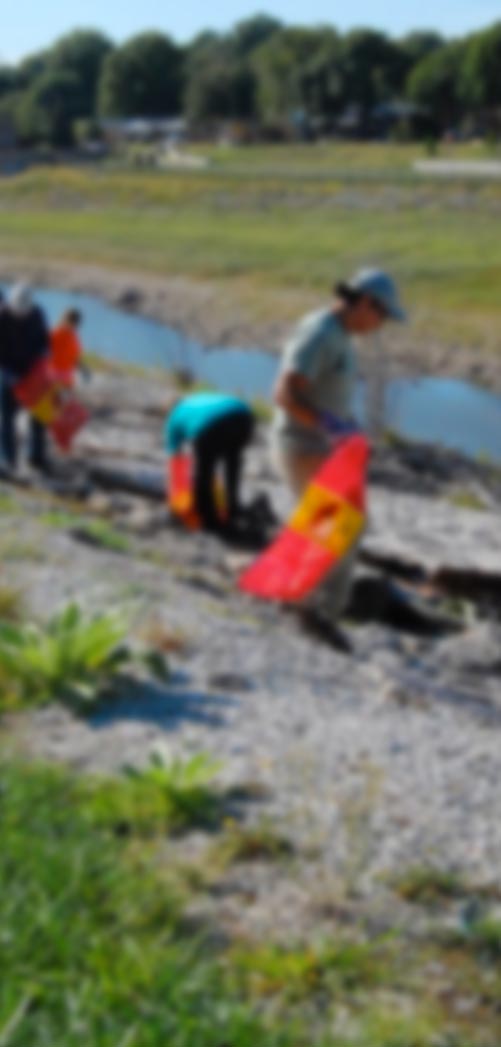The Puhinui Stream in Mangere has won this year’s Supreme Award for New Zealand’s Most Improved River.
While it still rates poorly overall on most water quality indicators many people have been working hard to clean it up, and their hard work is paying off.
“It may seem odd that a less than perfect stream has won, but the point is that it’s consistently getting better, and that is what matters here,” says Andrew Gawith, the manager of the NZ River Awards. “This result shows that, with enough goodwill and hard work, people can restore even degraded rivers.”
The Auckland Council has retired land from grazing in the Puhinui’s headwaters, many community and school groups have been planting its banks, and earlier this year a record breaking clean-up saw 1900 volunteers fish out 13 tonnes of rubbish from the stream.
The River Awards, run by the NZ Rivers Trust and the Morgan Foundation, recognise long-term improvement in a specific water quality indicator, which this year was the macroinvertebrate community index (MCI) - a good indicator of general river health (see below for a detailed explanation).
The second most improved river nationally was the Maitai River, which flows through Nelson City, and the third placed river was the Maketawa Stream in Taranaki.
Puhinui Stream Auckland 5.6%pa trend improvement in MCI
Maitai River Nelson 2.9%pa trend improvement in MCI
Maketawa Stream Taranaki 2.5%pa trend improvement in MCI
Andrew Gawith says the awards accentuate the positive by recognising the most improved rivers in each region.
“Nationally, though, there are few rivers showing a significant and meaningful improvement in water quality as measured by the MCI,” he says.
The judges had MCI data from 820 freshwater monitoring sites around the country and of these just 62 demonstrated a significant trend improvement in MCI – that’s about 7%.
Most of the others showed no trend.
Mr Gawith says it is encouraging that more councils, communities and individuals now recognise that the cumulative impact of many actions can help improve river health. Fixing leaking waste water pipes, clearing rubbish from streams, narrowing the river bed to speed up the flow, riparian fencing and planting, soil conservation planting and careful forest harvesting all help.
“There’s a steady change in attitude, particularly among farmers, that they have a responsibility to protect their local waterways by changing their management practices,” Mr Gawith said. “A combination of encouragement, publicity and coercion will keep pushing this transformation.”
There were three judges for the River Awards: Dr Roger Young (Cawthron Institute), Dr Clive Howard-Williams (NIWA) and Dr Mike Scarsbrook (Dairy NZ). The latest information on macroinvertebrate species composition at monitoring sites around the country is compiled each year by regional councils for display on the Land, Air, Water Aotearoa (LAWA) website (www.lawa.org.nz). This dataset was used to determine the award winners. The judges report is attached.
The Regional Award winners were:
Region River and monitoring site trend improvement in MCI
Auckland Puhinui Stream 5.6%pa
Nelson Maitai River 2.9%pa
Taranaki Maketawa Stream 2.5%pa
Wellington Wainuiomata River 2.2%pa
Southland Mataura River 2.1%pa
Horizons Makuri River 2.0%pa
Bay of Plenty Pongakawa River 1.8%pa
Waikato Whirinaki Stream 1.7%pa
Canterbury Avon River 1.6%pa
Hawkes Bay Mangaonuku Stream 1.2%pa
Northland Waipapa Stream 4.7%pa*
*The Waipapa Stream has been monitored for MCI for the past 8 years and the monitoring site is close to the Kerikeri estuary. It was therefore not considered for a national Award, but the judges agreed that it should receive an Award for the most improved river in Northland.
River Stories
The Awards evening also featured stories from around the country relating to water management and the environment.
“All are inspiring examples of individuals, communities, organisations and businesses working to restore New Zealand’s waterways”, Mr Gawith said.
The 2016 River Story Award went to:
The Waitao River community in the Bay of Plenty
More than three decades ago a small group of Maori at the bottom end of the river started agitating and working to restore the health of the river, which had once been an abundant larder for local hapu. It has taken more than 30 years to convince others that something had to be done to save this important river. And now the whole community are chipping in to fence, plant and protect the river and nurse it back to something like the food basket it once was. In restoring the river, they have restored their community.
The Reo mo te Awa (voice for the river) Award was presented to:
Millan Ruka
His gentle, persistent and highly effective campaign in Northland has shown what one motivated man can do to make people aware of what’s happening to our rivers and to change attitudes. In reporting damage to his local rivers he’s risked getting offside with his farming community - among them, friends and relations. He has sunk his retirement savings into equipment to patrol the rivers and dedicated time and energy to understand the regulations, science, and how to communicate effectively with officials and the media. He’s well recognised media commentator on rivers and not just in Northland. Millan has real gumption and guts and he is an important voice for our rivers.
For details on the Award winning rivers and river stories please contact either:
Andrew Gawith Penny Deans
027 4511 417 021 349 539
